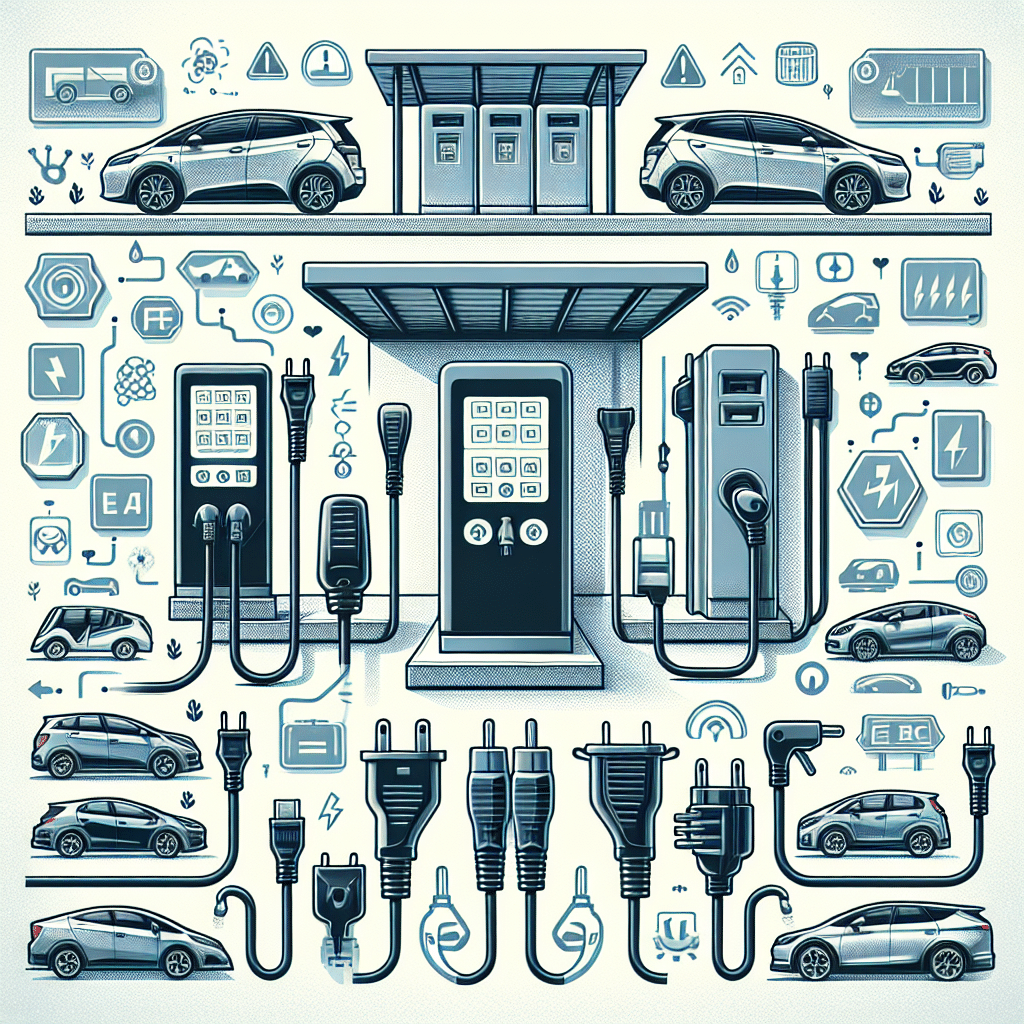Understanding EV Charging Standards
Electric vehicles (EVs) have become increasingly popular with the rise of eco-friendly alternatives to traditional gas-powered cars. One of the key components of widespread EV adoption is an expansive network of public charging stations. However, the charging experience can vary significantly based on the type of EV you own and the charging station available. Understanding the different charging standards and the role of versatile EV adapters is pivotal for seamless access to charging infrastructure.
Types of EV Charging Connectors
-
Type 1 (SAE J1772):
- Predominantly used in North America and Japan.
- Typically supports Level 1 and Level 2 charging.
- Single-phase AC power delivers up to 80 amps, allowing for a charging capacity of approximately 19.2 kW.
-
Type 2 (IEC 62196):
- Commonly used in Europe and much of the world.
- Supports both single-phase and three-phase charging.
- Capacity ranges from 3.7 kW to 43 kW, making it more suitable for commercial applications and faster charging.
-
CCS (Combined Charging System):
- An extension of Type 1 and Type 2 connectors, CCS includes two additional pins for DC fast charging.
- Supports charging rates of up to 350 kW, facilitating rapid charging capabilities at public stations.
-
CHAdeMO:
- A widely adopted standard for DC fast charging, primarily used by Asian manufacturers like Nissan and Mitsubishi.
- Offers charging rates that can exceed 62 kW, making it suitable for quick charging on the go.
-
Tesla Connector:
- Tesla uses its proprietary connector in North America but provides adapters for other connections.
- With high charging rates available at Tesla Superchargers, Tesla vehicles can recharge significantly faster compared to standard chargers.
The Importance of Versatile EV Adapters
Versatile EV adapters are the bridge that facilitates charging across different connector types, promoting accessibility and convenience for EV owners. These adapters provide significant advantages, including:
Enhanced Accessibility
By using versatile adapters, EV owners can access a wider range of charging stations irrespective of the connector type. This is especially vital for travelers or individuals using public infrastructure in unfamiliar regions.
Cost-Effective Solution
Investing in high-quality adapters can save EV owners from the need to purchase multiple vehicles or invest in station-specific charging solutions. It allows users to ensure they are not restricted by their vehicle’s native charging capabilities.
Flexibility for Future Upgrades
As the EV market evolves and new charging technologies emerge, having versatile adapters ensures that consumers can adapt without needing to change their vehicle. This future-proofing is essential, considering the rapid advancements in electric vehicle technology.
Different Types of Versatile EV Adapters
-
Universal Adapters:
- These adapters effectively translate different charging standards. They typically allow Type 1 vehicles to charge at Type 2 stations and vice versa.
- They are essential for ensuring compatibility, especially for multi-connector charging stations.
-
DC Fast Charging Adapters:
- Designed for rapid charging stations, these adapters enable vehicles equipped with DC charging capabilities (CCS, CHAdeMO) to access high-speed charging infrastructure.
- These adapters can connect a Type 2 vehicle to a CHAdeMO station, thus maximizing charging speed.
-
Mobile Charging Adapters:
- Lightweight and portable, these adapters are perfect for EV owners who wish to charge their vehicles from various sources, such as home outlets or industrial power outlets.
- Mobile charging solutions may include various plug types for versatility.
Selecting the Right Adapter
When choosing an adapter, consider compatibility with your vehicle, the maximum charging speed required, and the types of charging stations you anticipate using.
Key Factors to Consider
- Charging Formats and Standards: Ensure that the adapter supports both your vehicle’s standard and the public charging stations available in your area.
- Material Quality: Look for adapters made from durable materials that can withstand wear and tear. High-quality manufacturing ensures safety and longevity.
- Safety Features: Some adapters come equipped with built-in safety mechanisms, including surge protection and temperature control, enhancing user safety during charging.
- Warranty and Support: Choose adapters backed by manufacturers with solid customer support and warranty policies, ensuring you can get assistance if needed.
Popular Brands
Numerous manufacturers specialize in EV charging adapters. Popular brands recognized for their quality and reliability include:
-
JuiceBox:
- Known for their versatile charging solutions and comprehensive compatibility with various EV models.
-
BLAUPUNKT:
- This brand produces durable and user-friendly adapters enhanced with safety features, making them a favorite among consumers.
-
EVBox:
- This manufacturer focuses on creating innovative charging solutions and offers several versatile options to meet diverse needs.
-
Tesla:
- While Tesla vehicles tend to use their proprietary connectors, the availability of adapters allows Tesla owners to charge at various public stations, making Tesla one of the leading brands in the field.
The Future of EV Charging Adapters
As the electric vehicle market matures, the demand for adaptable solutions will continue to grow. Emerging technologies like wireless charging and smart charging will likely shape the next generation of EV adapters. Keeping abreast of these trends ensures that you remain equipped for any arising challenges in the EV charging landscape.
Conclusion: Seamless Integration for EV Owners
The need for versatile EV adapters in public charging infrastructure is undeniable, as the diversity of charging standards presents challenges for EV owners. As both the technology and ethical considerations around clean energy evolve, having the right tools at your disposal will ensure a smooth and efficient charging experience. Ultimately, investing in the right versatile EV adapters contributes to a more sustainable and user-friendly future for electric vehicle owners.
